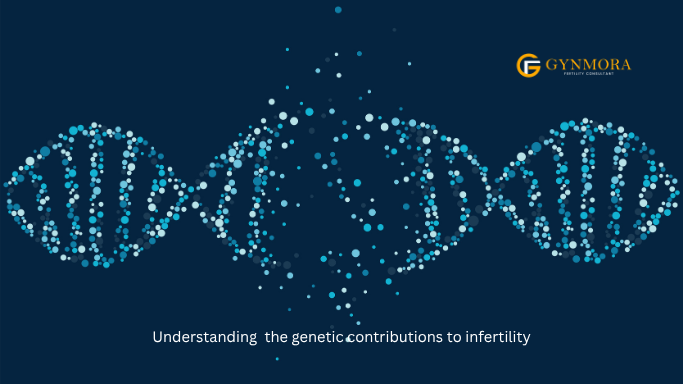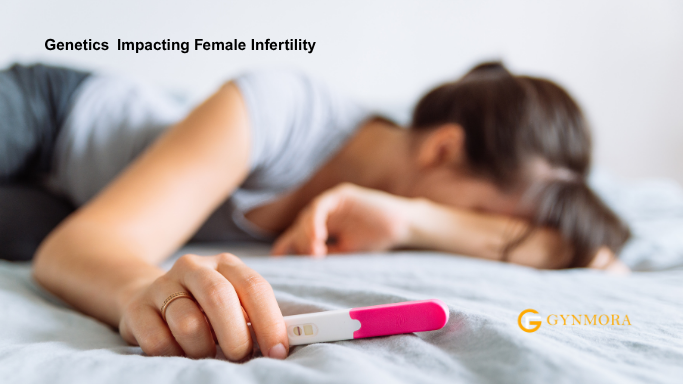Is Infertility Genetic? Investigating the heritable traits that affect fertility.
Deciphering the Genetics of Infertility

Genetic reasons behind infertility is one of the most leading problems faced by the couples all around the globe, but couples often have this question on their mind: is infertility genetic a hereditary disease? We all know infertility can have multiple causes, but genetics can play a big role in reproductive health in both men and women. Genetic conditions that are inherited or mutations that occur spontaneously can negatively affect the ability to conceive.
Understanding the genetic contributions to infertility is a key step in determining the diagnostic testing and management approaches. This article explores hereditary factors impacting fertility, diagnostic methods and available treatments.

Genetics Impacting Female Infertility

There are several genetic conditions that can impact female fertility:
1. Chromosomal Abnormalities
Chromosomal defects including structural (balanced) or numerical abnormalities can lead to Ovarian dysfunction and fertility problems. Turner syndrome, with its missing or incomplete X chromosome, for example, commonly results in underdeveloped ovaries and infertility.
2. Single-Gene Mutations
Mutations in certain genes can have an impact on reproductive health. For instance, mutations within the FMR1 gene relate to Fragile X syndrome, linked to premature ovarian insufficiency and infertility.
3. Polycystic Ovary Syndrome (PCOS)
PCOS is a common hormonal disorder with a genetic basis that causes a range of issues affecting ovulation and fertility. A family history of PCOS increases the risk that a woman will develop the condition.
SNP Implication of Male Fertility

So too genetic anomalies can disrupt male fertility:
1. Y Chromosome Microdeletion
Any deletions in particular regions of the Y chromosome can cause lower sperm numbers or a complete lack of sperm (azoospermia), leading to infertility.
2. Klinefelter Syndrome
Men with KS have an extra X chromosome (47,XXY) which results in low testosterone levels, impaired spermatogenesis and infertility.
3. Cystic Fibrosis Gene Mutations
CFTR mutations associated with cystic fibrosis can present as congenital absence of the vas deferens, obstructing sperm transport and leading to infertility.
Diagnosing Genetic Causes of Infertility
Diagnostic approaches for identifying genetic causes of infertility include:
1. Karyotyping
This test looks at chromosomal structures for abnormalities that could interfere with fertility.
2. Y Chromosome Microdeletion Testing
This test may be performed to detect deletions in the Y chromosome associated with infertility in men with low sperm counts.
3. Genetic Mutation Screening
Doctors may test for specific gene mutations (like CFTR mutations) as a potential cause of infertility.
4. Preimplantation Genetic Testing (PGT)
In cases of couples undergoing IVF, PGT is a tool that screens embryos for genetic abnormalities (like aneuploidy) before they are planted into the uterus, which increases the chances of a successful pregnancy.
Genetic Infertility: Treatment Options
However, thanks to advances in reproductive medicine, there are treatment options for genetic infertility:
1. Assisted Reproductive Technologies (ART)
Assisted reproductive technologies such as in vitro fertilization (IVF) and intracytoplasmic sperm injection (ICSI) can help people with genetic infertility get pregnant.
2. Hormone Therapy
Hormonal therapies may also treat fertility-affecting endocrine disorders like PCOS.
3. Use of Donor Gametes
In this case, if there are significant genetic problems affecting gamete quality, it may be possible to conceive using donor sperm or eggs.
4. Genetic Counseling
(Genetic counseling) Consulting with a genetic counselor shortens the gap a little; genetic counselors are trained to help translate genetic findings into actionable information for individuals, including decisions about family planning.
Preventing Genetic Infertility?
Is Infertility Genetic | Though genetic predispositions cannot be changed, early detection and intervention can improve fertility outcomes. For people that are worried about genetic infertility, the first step should always be to stay healthy and consult your doctor about any concerns.
FAQs
1. Does that mean infertility is always genetic?
No many factors can contribute to infertility, such as lifestyle choices, environmental exposures, and medical conditions. Genetics is only one factor that affects fertility.
2. How can I know if my infertility is genetic?
A fertility specialist can help determine if the underlying cause of infertility is genetic through genetic testing.
3. How do you treat genetic infertility?
For example, treatment strategies may involve alleviating the specific underlying genetic defect through assisted reproductive technologies, hormone replacement therapy, and/or using donor sperm (or eggs). They should also undergo genetic counseling, because it is very useful in helping patients to understand their reproductive options.
Overall Purpose
In this article, we try to explain the genetics behind infertility and discuss various diagnostic and treatment modalities
Thank You

Thank you for reading! If you liked this guide, discover more fertility information and schedule consultations with specialists at Gynmora.
So thank you for reading this little overview into the genetics affecting infertility. Insights gained from this research have laid the groundwork for targeted interventions and informed decision making for individuals and couples experiencing fertility challenges.




Review Is Infertility Genetic.